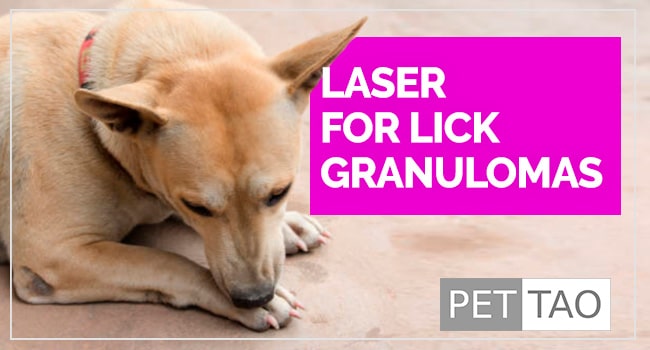When I adopted Suede from the ASPCA, food allergies left his paws red and irritated.
Once I got him on a home-cooked diet, his food allergies disappeared.
However, he continued to lick his paws.
When Suede didn’t lick them, they looked great.
But, when he was licking his paws, they become red and irritated.
Luckily, I’ve successfully alleviated Suede’s lick granulomas by applying lavender oil to his paws.
He doesn’t like the taste and the scent relaxes him.
Suede’s case was mild.
Some pets have severe lick granulomas.
What is a Lick Granuloma?
When a dog experiences inflammation from arthritis pain, disc issues, fleas, food allergies, anxiety, wounds, or cancer, he or she often licks the affected area.
Once the dog gets into the habit of licking, it is often difficult to stop.
The repeated licking may lead to a wider and deeper wound, hair loss, and infection.
Deep infections require long courses of antibiotics and sometimes steroids.
Anxious dogs can benefit from TCVM treatments such as lavender oil or chiropractic medicine.
Combination therapy is often the most successful.
How Can Lasers Help?
A CO2 laser uses highly concentrated light energy to remove the sore.
Also effective is the Class IV laser, known as low level, or cold, laser therapy.
Scientists categorize laser strength by class.
While a laser pointer classified as Class I-IIIa, Class IV penetrates into muscle, tendon, ligaments, and bone.
The laser is often used in wound care to reduce inflammation, swelling, muscle spasms, stiffness, and pain.
Class IVs also treat arthritis and soft-tissue injuries.
Because the light is warming, animals tend to relax during the procedure.
The laser increases oxygen turnover in the tissues, making ATP (adenosine triphosphate) energy, which prompts healing.
Veterinarians recommend starting laser treatments two to three times per week for a few weeks.
Sessions then taper off to once a week and every two weeks, as the wound shrinks.
Why Other Treatments Fall Short
Natural or holistic pet parents probably hesitate to give their pets drugs for anxiety or pain, when TCVM treatments are highly effective.
Never combine pharmaceuticals, which often have dangerous side effects, with other medications before contacting your veterinarian.
However, natural treatments such as laser therapy, exercise, diet, and Eastern or Western herbs offer little to no side effects and can be combined with other treatments.








